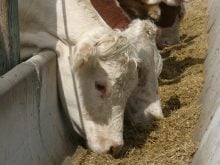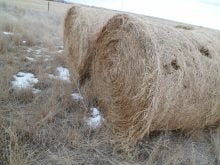Alberta off-campus Kindergarten to 12 learning institutes are providing course material on the province’s ranching sector which the head of the provincial cattle feeders’ association is calling deeply problematic, flawed and out right false.
Course material provided to students, and obtained by The Western Producer, links the province’s feedlot alley located near Lethbridge to sickness of area residents and death of children.
“Residents in Alberta’s feedlot alley have the highest rates of intestinal disease in the province. In a three-year period from 1989 to 1991, E. coli killed almost a dozen children and affected scores more in southern Alberta’s cattle country,” read one section of Modern Agricultural Economies – Animals course material.
Read Also

Using artificial intelligence in agriculture starts with the right data
Good data is critical as the agriculture sector increasingly adopts new AI technology to drive efficiency, sustainability and trust across all levels of the value chain.
The section also references the Walkerton, Ont., water crisis which killed seven residents of the region as well as sickened thousands of others during an E. coli outbreak in 2000.
“Is our health being compromised? In a study published in 2000, Health Canada mapped cattle densities and the incidence of E. coli infections in rural Ontario only to discover that six counties with a high cattle density — with Walkerton located right in the middle — routinely registered the highest rates of infection from 1990 to 1995,” read the course material.
What’s not mentioned in the course material is that an inquiry into the Walkerton E. coli outbreak blamed inadequate water treatment procedures for the crisis. Nor did it mention that two administrators of that community’s water treatment facility were charged and convicted for their shortcomings in properly treating and monitoring the potable water supply.
“Most producers support higher standards simply because disasters like Walkerton aren’t good for business,” read the course material, which also neglects to mention Alberta’s Water for Life strategy which increased standards for water treatment facilities in the wake of the Walkerton crisis.
Janice Tranberg, Alberta Cattle Feeders’ president, called the material being shared with students, “deeply disturbing.”
“Very disappointing that resources are being shared with students that have not gone through rigorous vetting because there are multiple examples of inaccuracies, that with two seconds of review, people could see that they have their information incorrect,” said Tranberg.
When asked about the vetting process for grade-school course material at off-campus learning institutes, Alberta education minister Adrianna LaGrange said the department has staff that oversee course resources and determine what is to be allowed and put in the curriculum.
“Beyond that, teachers do have the ability to choose resources themselves and bring them into the classroom,” said LaGrange. “That being said, we want to make sure the information that is taught to our students is the most accurate, most up to date.”
In a statement provided to The Western Producer on April 14, the department said Modern Agricultural Economies course material is neither part of provincially developed curriculum nor a provincially developed resource.
“Alberta Education does not currently authorize the resource, Modern Agricultural Economies – Animals. However, school authorities have the autonomy, flexibility and responsibility to make local policy decisions and determine which supports, resources or programs, such as Modern Agricultural Economies – Animals, are most appropriate for their students and school community. It is up to school authorities to choose resources to meet curriculum requirements, while providing a balanced approach to subject matter,” read the statement.
But according to the superintendent of the Strathmore-based Golden Hills Academy of Learning, the course material is from the previously government-supported Alberta Distance Learning Centre.
Supt. Bevan Daverne said his school has removed the questionable course material from its distance learning classes after being alerted to its contents and that only a small number of his students were exposed to the references critical of Alberta’s feedlot industry.
“We’ve just eliminated it from the course,” said Daverne, adding it was material ranchers might find offensive and it doesn’t correspond with the reality of how the industry is run today.
The Alberta Distance Learning Centre provided provincial students with correspondence courses for decades before closing following the 2020-21 school year.
“Alberta Distance Learning Centre was funded directly by Alberta Education, by the provincial government, to develop resources and to serve students online and distance learning all across Alberta,” said Daverne. “And they were also funded to share all their resources they developed with every school division all across Alberta.”
Daverne said he believed the course material is dated and while the questionable parts linking health issues to the feedlot have now been removed, all the material is scheduled to be revamped.
Contact alex.mccuaig@producer.com
















